| The Kenny Rogers Story | ||||
|---|---|---|---|---|
 | ||||
| Compilation album by | ||||
| Released | 1985 | |||
| Recorded | 1976–83 | |||
| Genre | Country | |||
| Label | Liberty Records | |||
| Kenny Rogers chronology | ||||
| ||||
The Kenny Rogers Story is a compilation album by country singer Kenny Rogers.
| The Kenny Rogers Story | ||||
|---|---|---|---|---|
 | ||||
| Compilation album by | ||||
| Released | 1985 | |||
| Recorded | 1976–83 | |||
| Genre | Country | |||
| Label | Liberty Records | |||
| Kenny Rogers chronology | ||||
| ||||
The Kenny Rogers Story is a compilation album by country singer Kenny Rogers.
As one of the many collections issued by Rogers, The Kenny Rogers Story: 20 Golden Hits was issued in the UK in 1985. It was never released in the US, and collects most of his UK Top 40 pop hits as well as various other singles that, while they never made it to high positions in the mainstream charts there, were popular among fans of both country and easy listening/middle of the road genres. It is similar to the 1983 issued 20 Greatest Hits from the US.
For this album, Rogers sang solo several songs from his days with The First Edition in the 1960s and early 1970s, including the No. 1 hit "Ruby, Don't Take Your Love to Town" and the top ten success "Something's Burning", as well as "Reuben James" (while this was not a pop hit in Britain, it was nevertheless well known, receiving regular airplay). Elsewhere the album includes tracks from his solo days with United Artists Records and Liberty Records. (See below for song list). Some fans have been bemused as to why his 1983 hit single with Dolly Parton, "Islands in the Stream", is "missing" on this collection. However, this track was recorded with RCA Nashville after Kenny left Liberty.
In addition to being issued on the popular formats of vinyl, cassette and compact disc, The Kenny Rogers Story was also issued on the short lived Digital Compact Cassette. The album was eventually deleted in the mid-1990s following the release of the similar themed collection Daytime Friends - The Very Best of Kenny Rogers .
The Kenny Rogers Story was a huge success reaching No. 1 in the UK country albums chart and No. 4 on the pop chart . It remained one of the top selling country collections for over four years, out-selling all his previous albums, and was the biggest selling country album of 1985 in the UK. In 1989, it still ranked No. 2 on the UK chart.
In what seems a tradition with Rogers' UK releases, where artwork is oft-duplicated, this album matches the 1985 album Love Is What We Make It .
| No. | Title | Notes | Length |
|---|---|---|---|
| 1. | "Lucille" | #1 UK, originally issued on the 1977 album Kenny Rogers | 3:37 |
| 2. | "Lady" | #12 UK, originally issued on the 1980 album Greatest Hits ; in the UK, titled Lady | 3:54 |
| 3. | "The Long Arm of the Law" | Originally issued on the 1980 album Greatest Hits (in the UK, titled Lady | 4:20 |
| 4. | "You Decorated My Life" | Originally issued on the 1979 album Kenny | 3:40 |
| 5. | "Sweet Music Man" | Originally issued on the 1977 album Daytime Friends | 4:21 |
| 6. | "Ruby, Don't Take Your Love to Town" | A 1977 re-recording of a First Edition hit from 1969 | 2:52 |
| 7. | "Love or Something Like It" | Originally issued on the 1978 album Love Or Something Like It | 2:54 |
| 8. | "Through the Years" | Originally issued on the 1981 album Share Your Love | 4:46 |
| 9. | "You Are So Beautiful" | Originally issued on the 1983 album We've Got Tonight | 2:54 |
| 10. | "Don't Fall in Love with a Dreamer" (with Kim Carnes) | Originally issued on the 1980 album Gideon | 3:41 |
| 11. | "The Gambler" | Originally issued on the 1978 album The Gambler | 3:32 |
| 12. | "Daytime Friends" | #39 UK, originally issued on the 1977 album Daytime Friends | 3:14 |
| 13. | "We've Got Tonight" (with Sheena Easton) | #28 UK, originally issued on the 1983 album We've Got Tonight | 3:53 |
| 14. | "Love Lifted Me" | Originally issued on the 1976 album Love Lifted Me | 3:47 |
| 15. | "Coward of the County" | #1 UK, originally issued on the 1979 album Kenny | 4:20 |
| 16. | "Reuben James" | A 1977 re-recording of a First Edition single | 2:41 |
| 17. | "Desperado" | Originally issued on the 1977 album Daytime Friends | 3:47 |
| 18. | "She Believes In Me" | #42 UK, originally issued on the 1978 album The Gambler | 4:13 |
| 19. | "Something's Burning" | A 1977 re-recording of a 1970 First Edition hit | 4:20 |
| 20. | "Blaze of Glory" | Originally issued on the 1981 album Share Your Love | 2:38 |
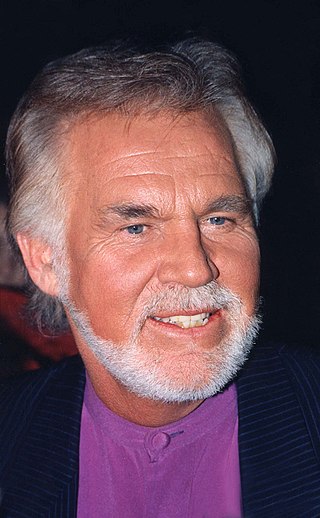
Kenny Rogers was an American singer and songwriter. He was inducted into the Country Music Hall of Fame in 2013. Rogers was particularly popular with country audiences but also charted more than 120 hit singles across various genres, topping the country and pop album charts for more than 200 individual weeks in the United States alone. He sold more than 100 million records worldwide during his lifetime, making him one of the best-selling music artists of all time. His fame and career spanned multiple genres: jazz, folk, pop, rock, and country. He remade his career and was one of the most successful cross-over artists of all time.

The Gambler is the sixth studio album by American singer Kenny Rogers, released by United Artists in November 1978. One of his most popular, it has established Rogers' status as one of the most successful artists of the 1970s and 1980s. The album reached many markets around the world, such as the Far East and Jamaica, with Rogers later commenting "When I go to Korea or Hong Kong people say 'Ah, the gambler!'". The album has sold over 5 million copies.
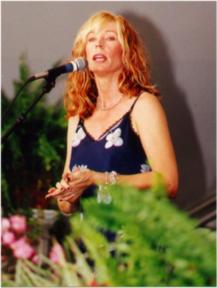
Juice Newton is an American pop and country singer, songwriter, and musician. Newton has received five Grammy Award nominations in the Pop and Country Best Female Vocalist categories – winning once in 1983 – as well as an ACM Award for Top New Female Artist and two consecutive Billboard Female Album Artist of the Year awards. Newton's other awards include a People's Choice Award for "Best Female Vocalist" and the Australian Music Media's "Number One International Country Artist".

"Islands in the Stream" is a song written by the Bee Gees and recorded by American country music artists Kenny Rogers and Dolly Parton. It was released in August 1983 as the first single from Rogers's fifteenth studio album Eyes That See in the Dark. The Bee Gees released a live version in 1998 and a studio version in 2001.
"Ruby, Don't Take Your Love to Town" is a song written by Mel Tillis about a paralyzed veteran who lies helplessly as his wife "paints up" to go out for the evening without him; he believes that she is going in search of a lover. As he hears the door slam behind her, he claims that he would murder her if he could move to get his gun, and pleads for her to reconsider. A line in the song about a "crazy Asian war" and the time of the song's release led to the assumption that the song was about a veteran of the Vietnam War, though this was never stated in the lyrics. However, Tillis stated that the song was about a veteran of World War II.

Kenny Rogers and the First Edition, until 1970 billed as The First Edition, were an American rock band. The band's style was difficult to singularly classify, as it incorporated elements of country, rock and psychedelic pop. Its stalwart members were Kenny Rogers, Mickey Jones and Terry Williams. The band formed in 1967, with folk musician Mike Settle and the operatically trained Thelma Camacho completing the lineup.

William Harold Dean Jr. is an American country music singer and songwriter.
Music for Pleasure and Classics for Pleasure (CFP) were British record labels that issued budget-priced albums of popular and classical music respectively. Albums were subsequently released under the MFP label in Australia (MFP-A) and South Africa. MFP was set up in 1965 as a joint venture between EMI, which provided the source material, and the publisher Paul Hamlyn, which handled distribution in so-called non-traditional outlets, such as W.H. Smith, the booksellers.

Once Upon a Christmas is a collaborative studio album by Kenny Rogers and Dolly Parton. It was released on October 29, 1984, by RCA Records. The album was produced by Rogers with David Foster. It was Rogers' second Christmas album, following 1981's Christmas, and Parton's first. The album's release was accompanied by a CBS television special, Kenny & Dolly: A Christmas to Remember. The album was certified 2× Platinum by the RIAA in 1989.
"Goodbye Marie" is a country-pop song written by Mel McDaniel and Dennis Linde. The song is about a man who has to leave his lover to head for "the lonesome highway" back to his home in Houston, Texas. It was first released by Johnny Rodriguez on his March 1979 album, Rodriguez Was Here.

"We've Got Tonite" is a song written by American rock music artist Bob Seger, from his album Stranger in Town (1978). The single record charted twice for Seger, and was developed from a prior song that he had written. Further versions charted in 1983 for Kenny Rogers as a duet with Sheena Easton, and again in 2002 for Ronan Keating.

"Real Love" is a song written by David Malloy, Richard "Spady" Brannon and Randy McCormick, and recorded as a duet by American entertainers Dolly Parton and Kenny Rogers that topped the U.S. country singles charts in August 1985. It was released in April 1985 the second single and title track from Parton's Real Love album. Released after the top-ten success of "Don't Call It Love", the song became Parton and Rogers' second country chart-topper as a duet act. However, "Real Love" did not fare as well on the pop singles charts as 1983's "Islands in the Stream" had done, stalling at number 91 on the Billboard Hot 100 and number 13 on the Adult Contemporary chart.

Greatest Hits is the second compilation album by American singer-songwriter Kenny Rogers. It was released in September 1980 and issued by Liberty Records. The album marks Rogers' first release after United Artists Group merged with Liberty. The album was certified 12× Platinum by the Recording Industry Association of America (RIAA), denoting shipments of 12 million copies in the US.
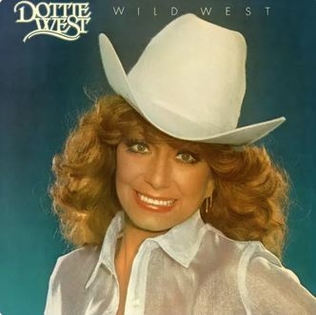
Wild West is a studio album by American country artist Dottie West. It was released by Liberty Records in February 1981. It was one of several albums that were part of West's commercial resurgence in the late 1970s and early 1980s. On the album were three singles: the chart-topping "Are You Happy?" and "What Are We Doin' in Love". The album itself was among West's highest-peaking, reaching the top five of the US country albums chart. It was met with favorable reviews from several music publications.
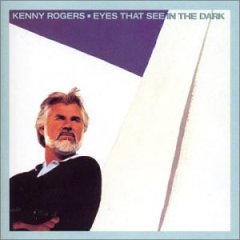
Eyes That See in the Dark is the fifteenth studio album by American country singer Kenny Rogers, released by RCA Records in August 1983.
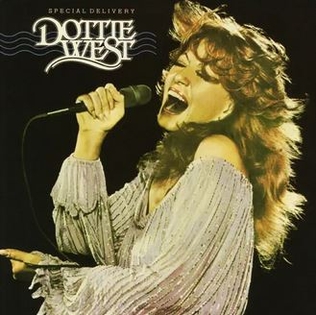
Special Delivery is a studio album by American country artist Dottie West. It was released by both Liberty Records and United Artists Records in November 1979. The album was released following a successful commercial comeback in West's career. Its new country pop production style was considered a departure from her previous recordings. The project consisted of ten tracks, six of which were composed by producers Randy Goodrum and Brent Maher. Three of the tracks were singles, including West's first solo chart-topper "A Lesson in Leavin'". Special Delivery reached the top 20 of the US country chart and was among her longest-running albums on the country survey
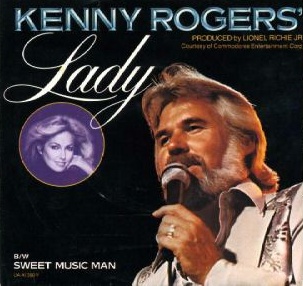
"Lady" is a song written by Lionel Richie and first recorded by American country music artist Kenny Rogers. It was released in September 1980 on the album Kenny Rogers' Greatest Hits.
Benjamin James Peters was an American country music songwriter who wrote many #1 songs. Charley Pride recorded 68 of his songs and 6 of them went to #1 on the American country charts. Peters was inducted into the Nashville Songwriters Hall of Fame in 1980.
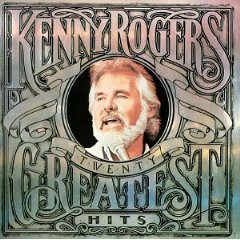
20 Greatest Hits is a compilation album by Kenny Rogers released by Liberty Records in 1983.

The albums discography of American country artist Dottie West contains 28 studio albums as a solo artist, five studio albums as a collaborative artist, 18 compilation albums and additional album appearance. Among West's studio releases were five collaborative albums with various artists, including Kenny Rogers. After signing with RCA Victor Records in 1963, West released her debut studio album Here Comes My Baby (1965). The album peaked at number 12 on the Billboard Top Country Albums chart in July 1965. West's third studio album Suffer Time (1966) spawned four singles, including "Would You Hold It Against Me", a top 5 hit on the Billboard Hot Country Songs chart. Suffer Time would reach number 3 on the country albums chart, West's highest-charting solo album. Between 1967 and 1968, West released 5 more studio albums. With All My Heart and Soul (1967) featured the top 10 hit "Paper Mansions" and the album itself peaked at number 8 on the Top Country Albums list. In 1969, she paired with Don Gibson for her first collaborative project Dottie and Don. The album featured the pair's number 2 Billboard country hit "Rings of Gold". In 1970, she collaborated with Jimmy Dean on the studio release Country Boy and Country Girl. In 1973, West had her biggest hit with the single "Country Sunshine". Its corresponding album of the same name peaked at number 17 on the country album chart in February 1974.